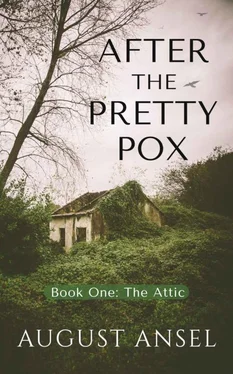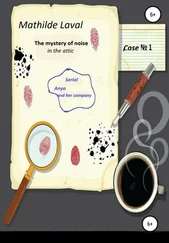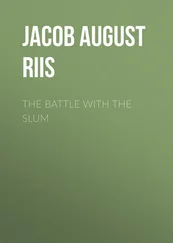Up the path, a quick scan, and into her yard. She let down the rope ladder and hauled it behind her when she was on the roof.
The three fish were small. She cooked them all on the fire inside. She could have fried them out on the roof; she had a low-slung steel fire pit up there. It sat on a heavy scrap of corrugated sheet metal, and in it she could build a deep bed of coals for cooking, out where the risk of fire was smaller. But right now she wanted to be inside, in the dark of the attic again.
When the house had belonged to her grandmother, the trash burner on the kitchen range vented through a small central flue. In the attic, Arie had rigged a tiny makeshift fireplace to vent through that old pipe. The top of the flue was partially screened by trees, so smoke was less visible and the smell of cooking dissipated above head-height. Even so, she laid only a tiny portion of dry wood. With these little trout the cooking was a matter of minutes, and she smothered the fire with sand immediately. She sat on the floor under her mandala, eating with her hands. The light from the sky panel was dappled in the afternoon; the shadows of an ancient plum tree moved in a freshening breeze. A tiny wind chime sounded, a remnant that still dangled somewhere on the block and indicated a change in the weather, southerly winds usually a harbinger of oncoming rain and storm. Arie relished the crackle of the trout’s crisp skin, and she sucked the brains and eyes from their heads.
The rest of the afternoon she spent setting things tightly in order. The possibility of storm always impelled her to double down on housekeeping matters, although today her sense of an oncoming problem was much more acute than her sense of rain. Knowing William was in the woods, out there close enough that if she were to step on the top rung of her sky panel, she could whistle loud enough for him to hear. The girl was a cipher to Arie, so she considered her not at all. She wanted to know that he was gone. Having him nearby gave a sense of an unwelcome conduit yawning open. Every few minutes, she conned the street with her binoculars. She saw only birds, mostly gulls defying the freshening onshore wind, hovering in place like tethered kites.
On the roof, she checked the water supply. A fifteen-gallon plastic jerry can was snugged beneath a special length of downspout that diverted from a rain gutter. Down in the yard, at the back of the house, was a full-sized rain barrel, sixty gallons. She hadn’t checked it for over a week, but with all the wet weather, it was likely brimming—there if the jerry can failed her.
At the garden boxes, she picked all the green beans still left on the vine, stuffing them into the deep pockets of her apron. The sky was already gray, a stack of dark clouds massing overhead, and the temperature dropped precipitously in a matter of minutes. Rain for sure, then. The smell of the ocean was cold and heavy.
Inside, she lowered the sky panel. The beans she set aside to string later and hang for drying. The only light was a silvery ripple on the far wall from the revolving turbine set into the peak of the roof. The windows set on either end of the attic were heavily curtained to prevent anyone seeing her candlelight or cooking fire, and she hadn’t pulled them open that morning. She could see well enough, once her eyes adjusted. Before she could settle down for the end of the afternoon, she needed to go below. Into the rooms of ruin. The bitten girl had been in there, and the dog. Arie had to check things and put it to rights.
In the center of the attic floor, there had once been a drop-down ladder that could be accessed from the hallway below. One of the things Arie had done when her grandmother passed was dismantle that little door, replace it with drywall and paint over it. She created a new way into the attic. It was a hidden hatch, set into the ceiling of an unused closet. It could only be opened from above, and she left it ajar when she had to go downstairs. When closed, the hatch was virtually invisible, its edges neatly fitted behind narrow trim that ran around the closet’s upper perimeter. Arie first bolted shut the sky panel, then unlatched the inside hatch. She lifted the panel aside and stepped down onto the built-in shelves, which served as her ladder. The closet door stood partway open, as did all the doors down below. Her face went into a spider web as she stepped out of the closet, and she wiped it away, blinking.
This had been her own bedroom, from age fifteen—when she came to live with Granny and Pop—until Granny’s death one year before the Pink. There was very little left in here from those days, only the torn corner of a poster of Mount Everest and the gnawed remnants of her mattress, home now to mice or rats. She inched her way silently out of the room.
It was all chaos in the rooms of ruin, a perfectly orchestrated symphony of disorder that Arie had spent as much time planning and constructing as she had the smooth-running systems she now lived in up above. Every room showed ample evidence of having been utterly ransacked. Burnables were gone, and the truly useless remnants of the time before were bashed into corners and the middle of the floor: a television set, a metal file cabinet, a seascape painted in oils on canvas, its wooden frame gone; a leather loveseat lay on its back under a thick skin of mildew, the overstuffed back torn and bleeding stuffing. Her grandmother had collected antique mirrors, and there were shards everywhere, making the floor a mosaic of reflected wreckage. Anything that could make noise and discourage the weary from taking refuge, Arie used. Besides the glass, there were empty cans and bottles, a certain amount of pea gravel from the alley behind the house, her grandmother’s music and movie collection, the slippery plastic discs in an unexpected scatter around one corner. There was even a mound of bear scat in plain sight near the middle of the dining room floor. This had been provided for her one day by a young black bear that had come foraging and left with an empty belly as well as empty bowels. The shit didn’t smell much anymore, not to Arie, but it did seem to act as a deterrent to smaller animals. When it dried completely she could burn it for fuel if she needed to, but when that day came she planned on scouting for a new pile that she could bring in from the woods herself—provided no bear made a second special delivery.
The girl’s footprints were there, same as they had been in the dirt of the path, but on the rotting hardwood floor they had no strong definition. The dog’s tracks were there too, overlapping, the striations of its claws like comb marks in the grime. In the kitchen the mess was exponential, broken dishes and useless kitchen rubbish tossed everywhere. A bashed-open garden window above the sink was full of vegetation blown in from the yard, the sink itself a foul-smelling mess of standing water, rotted plant matter, and a dead robin floating half-submerged. Stainless steel flatware littered the floor, especially in front of the partially boarded back door. There was a cudgel in one corner, a twisted metal chair leg it was, blood on the heavy end. This was what the girl had swung at the dog, swung and connected, clearly. Some windows were still intact, but Arie had made sure that there were enough broken panes to convince any would-be intruder that the house was unfit, even as a way station, even if they saw the red X slashed on the front door and weren’t scared off by threat of the Pink. Was anyone who’d survived it still worried? Probably not. Two years was enough to dull the edges of that particular panic, she thought. She was sure, though, that with all the empty houses running up and down the streets, and what seemed to be damn near all other people dead, one look at the mess she’d made in here would be a discouragement. The biggest impediment was in her grandmother’s room in the middle of the house. That door stayed closed. It was ruined, too, in a much more fundamental way.
Читать дальше












